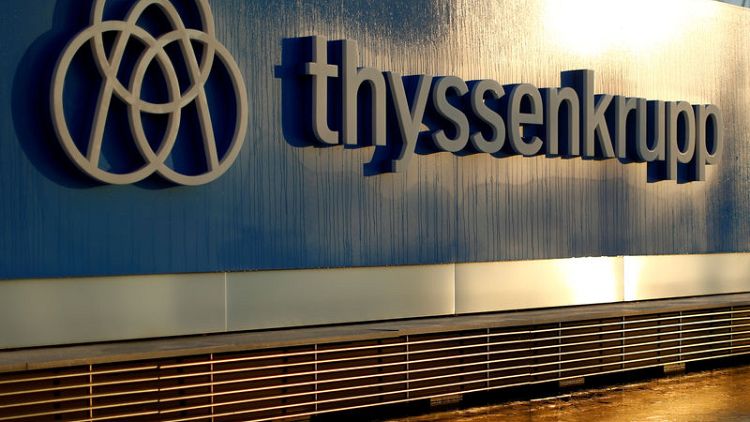By Christoph Steitz and Tom Käckenhoff
FRANKFURT/DUESSELDORF (Reuters) - Thyssenkrupp, in the midst of a major restructuring, needs to raise profit margins to avoid falling further behind rivals, one of the group's shareholders said on Thursday, a day ahead of the steel-to-elevator group's annual general meeting.
"In many cases the group's profitability is below average," Christoph Ohme, portfolio manager at German asset manager DWS, told Reuters.
"The businesses must become more profitable."
The group's adjusted profit margin fell to 3.6 percent last year from 4.4 percent in 2017, even though it slashed its corporate costs by 29 percent to 377 million euros (330 million pounds).
In Elevator Technology, Thyssenkrupp's most profitable business, its operating margin stood at 10.3 percent last year, behind main rivals Kone and Schindler, which made 11.5 percent and 11.7 percent, respectively.
Thyssenkrupp is currently implementing a major corporate overhaul, which includes a spin-off of its elevator, car parts and plant engineering units into a separate entity, arguing this will make it faster and more successful.
Investors have reacted with scepticism to the plans, with shares down 30 percent since the announcement in September.
Thyssenkrupp Chief Executive Guido Kerkhoff is expected to try and drum up support for the plan when he faces shareholders at the annual general meeting in Bochum on Friday.
Ohme said the breakup was a good move in principle, adding mid-term margin targets for the group's individual business units announced in November were acceptable.
DWS WATCHFUL
Asset manger DWS reduced its actively managed position in the steel-to-submarines conglomerate last year, which included the resignation of its former chief executive and chairman, two profit warnings and management reshuffles at some divisions.
Including index-tracking funds, DWS is Thyssenkrupp'a eleventh-biggest shareholder, owning 0.8 percent, or $82 million worth of the firm's stock, according to Refinitiv data.
"Now we are standing on the imaginary sidelines. We will be watching the further progress with an eagle eye," said Nicolas Huber, DWS's head of corporate governance.
One sticking point in Thyssenkrupp's split remains a lack of clarity over whether it will slim down the group's sprawling structure, a target of investor criticism due to its cost.
Switzerland's ABB, which in December decided to scrap its legacy matrix structure to give its business more entrepreneurial freedom, is considered as a model Thyssenkrupp could adopt.
Thyssenkrupp, plans to put the corporate split to a shareholder vote at its annual general meeting in 2020.
"A further slimming of the corporate structure beyond the planned breakup would be desirable," Huber said.



